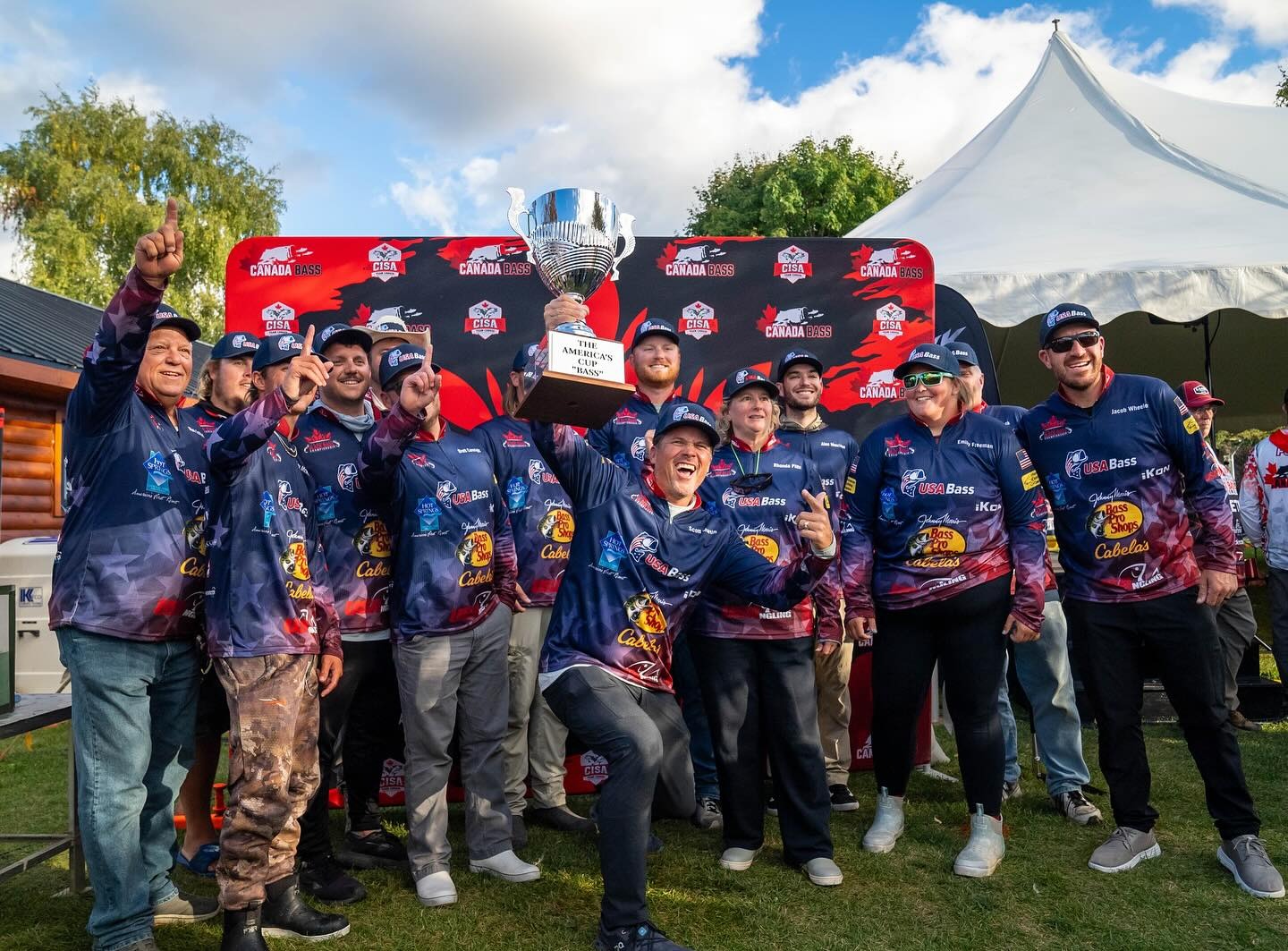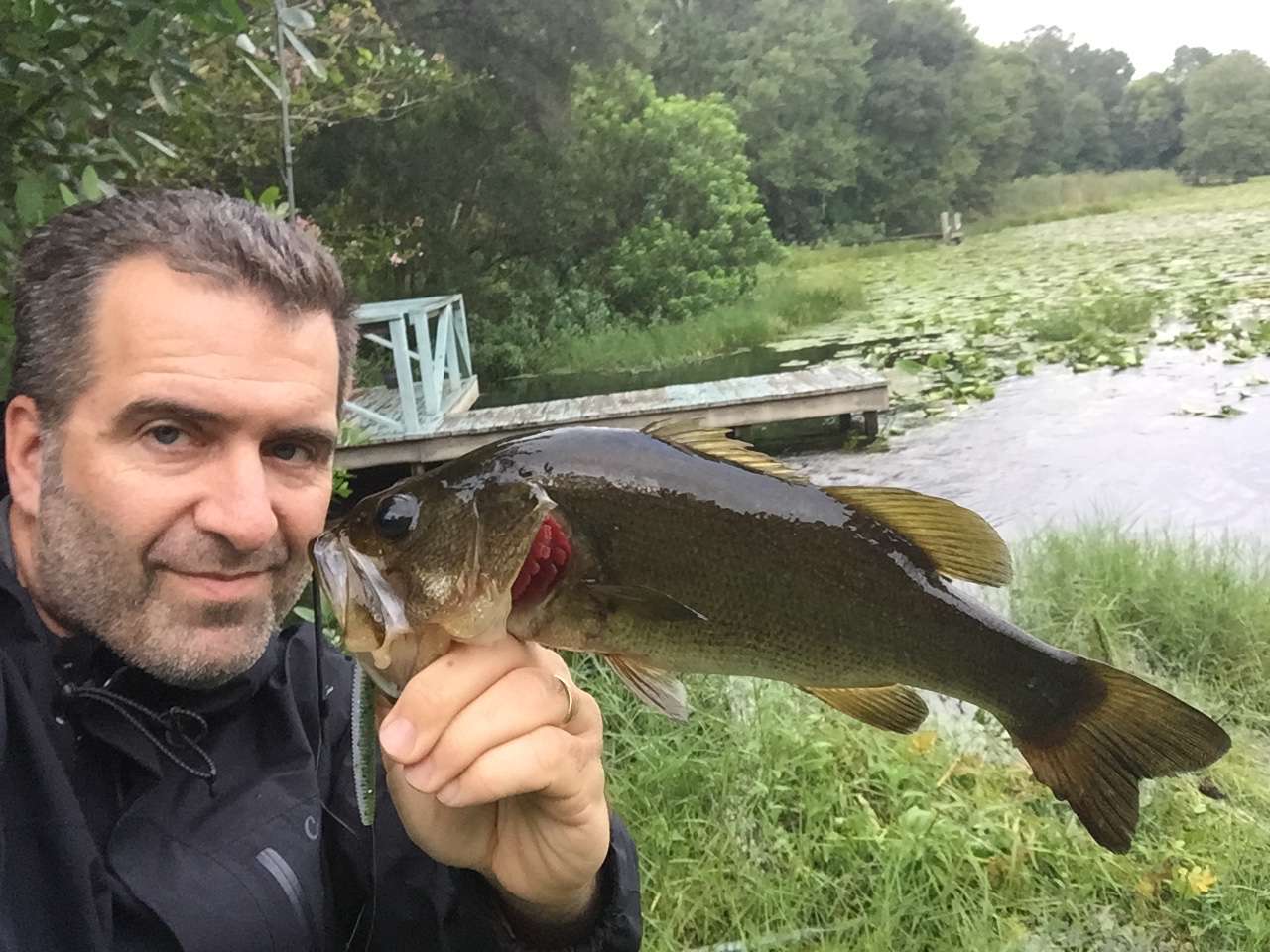
Rome was not built in a day, but neither will be Scott Martin’s dream of seeing bass fishing become an Olympic sport. To that point, as the Bassmaster Elite pro from Clewiston, Fla., heads to Italy’s capital in hopes of furthering that goal, he carries major momentum from a recent victory that’ll, no doubt, help amplify the message.
Captaining Team USA Bass, an element of USAngling, Martin guided his anglers to a Team Gold victory at the Pan-American Bass Fishing Championships, Sept. 25-29 at the St. John River in New Brunswick, Canada. That accomplishment included individual team gold medals for first-year Elites Tyler Williams and Rookie of the Year Trey McKinney.
“Canada was the favorite to win because that was their home turf, so it was a hard-fought battle,” Martin said of the two-day competition. “But what a great event. Canada put on a first-class event.”
The event
Hosted by the Canadian International Sportfishing Association, this year’s Championship fielded teams from the U.S., Canada, Puerto Rico, Colombia, Mexico and the Dominican Republic, along with two First Nations squads — Turtle Island and Wabanaki. China participated as a guest entrant.
Team USA brought six two-person teams with a blend of Bassmaster and Major League Fishing competitors, including female anglers Rhonda Pitts and Emily Freeman.
Although Martin described tournament waters as a different scenario than the Elite Series finale at the St. Lawrence River (straddling the U.S./Canada border), Williams was delighted with his familiarity.
“It was a really cool thing when they said what body of water it was,” said Williams, who hails from Belgrade, Me. “Even though I hadn’t been to that exact section (of the St. John River), I’ve done very well on the upper section that is in Maine.
“It’s three hours from my house, so it was amazing to win on a body of water that felt like home. Even with the northern events we’ve had on the Elites and the Tackle Warehouse Bassmaster Elite Qualifiers, I’ve never been able to fish anywhere that felt like home. It meant a lot!”
As we’ll see in a moment, Williams’ insight would deliver a key opportunity that helped seal the victory.

By the numbers
Team USA claimed five of the top 10 individual team spots.
Notably, Elite pros Cooper Gallant and 2023 Bassmaster Classic champion Jeff Gustafson competed for their Canadian homeland and earned seventh place.
Team USA tallied a combined 134 pounds, while Canada won the silver medal with 122.2. First Nations/Turtle Island took the bronze with 108.9.
Following Williams and McKinney in the pairs format were Joey Cifuentes and Joshua Weaver with 33.48 and bronze medalists Corey Gaffney and A.J. Howell of Canada with 32.8.
Team strategy
Describing Team USA’s pre-event effort, Martin said, “We did some research and found most of the fish were up the river. As Team Captain, I said we needed to focus on a section of the river that was not talked about hardly at all; that’s downriver from takeoff.
“We figured most people would go to where most of the population was, but we stayed in an area where there were fewer opportunities but a better grade of fish. No one else was on that section of the river, and we kind of had it to ourselves.”
Also, with tournament rules allowing anglers to confer and strategize on and off the water, Martin said the Team USA pairs communicated their progress to determine who was faring best each day.
As Martin explained, only four of a country’s individual team scores counted, so once intra-team leaders were determined, other Team USA boats would back out and allow them full run of key areas. This maximized the opportunities for overall team success.
“It was an interesting format that allowed us to game plan throughout the day and put together a really strong average,” Martin said.

Elite rookies shine
Leading the Team USA charge, McKinney and Williams did most of their work about 35 to 40 minutes downriver from takeoff, where they targeted grass and rock dropoffs.
“What we found out is that fish up there really don’t get off the bank that much; we really didn’t catch any roaming out in the middle,” McKinney said. “We fished in 6 to 20 feet and, even though that sounds like a wide range, the banks are really steep, so 8 to 20 is just a good pitch away.”
McKinney and Williams mostly caught smallmouth on jigs, Ned rigs and drop shots. Their lone exception came when Williams had to scratch the green fish itch.
“We knew some largemouth lived back in a creek because Tyler caught one in practice, but the odds were low because there’s not very many of them,” McKinney said. “On Day 2, we already had like 18 pounds and Tyler was like, ‘Can I go catch my largemouth?’
“I was like, ‘OK, buddy, let’s go.’ We went back in there and fished grass and on the third or fourth grass clump, he pitched his jig in there and caught a 3 1/2-pounder. That fish helped us win the gold medal.”
Looking ahead
Beyond the personal and team pride points, Martin said Team USA’s recent victory plays a key role in the ongoing pursuit of making bass fishing an Olympic sport. For several years, Martin and other senior members of Team USA have spearheaded a complex effort to navigate a strict international process for establishing new Olympic inclusions.
“What’s neat is when you look at the teams from these other countries, they have the same passion for the sport,” Martin said. “The movement is growing, and these international events are the future of bass fishing.
“Bassmaster has done such a fantasist job of promoting bass fishing in the United States from high school to the Elites, but where do we go next in this great sport of ours? It’s international, and I’m really excited about what this holds for the future and longevity of this sport.”
A huge piece of the puzzle comes down to participation. So, while he’s hoping for continued success in the Black Bass World Championship, Oct. 14-20 at Rome’s Bolsena Lake, Martin said Team USA’s Canadian victory added fuel to the fire.
“I think the media coverage and the exposure will draw attention to our goal,” Martin said. “But if you look at last year’s Black Bass World Championship in Portugal, Germany almost beat us.
“We won in a tiebreaker, but how awesome is it that a country that’s not known for bass fishing to almost win the gold medal? That’s a big deal, and it gives encouragement to these other countries to participate in this.”
McKinney, who at 19 became the youngest angler to win an Elite event and claim a Century Club belt with his 130-pound, 15-ounce four-day total at Lake Fork, agrees.
“It’s incredible seeing all the people outside the United States that have a love and passion for the sport and to realize how many brothers we have out there,” McKinney said. “It’s great that we can come together, have a good time, fish against one another and enjoy really good fellowship.”
Pondering the Olympic vision, McKinney offers this viewpoint: “We can have a lot of influence on a young angler who has the interest and the drive to fish when they see somebody in one of these (international events).
“Social media can be seen anywhere in the world, and if we can continue getting the message out there, there are so many places where bass fishing can grow or develop a bigger following. There is a huge opportunity, and it’s just getting the right message in front of the right people.”

